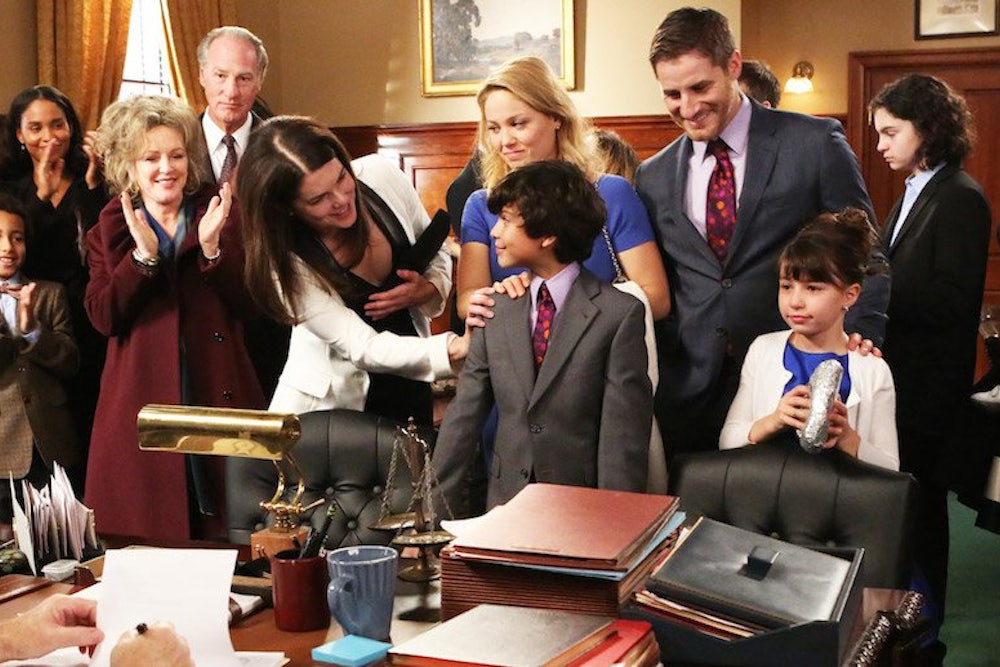It’s hard to talk about “Parenthood,” the NBC drama that just ended its six-season run, without bringing up kleenex, ugly-crying, and tsunamis of tears.1 So let me lay all my cards out on the table: I may have been the sole stone-hearted viewer in America who watched all of last night’s series finale with dry eyes.
Not that the show’s writers didn’t do their best: the episode included a wedding, a death, and a “Six Feet Under”–style montage that showed us the future of every member of the Braverman clan. There was an emo-folk cover of “Forever Young,” the show’s theme song, performed by Iron and Wine. They played Cat Stevens’ “Wild World.” There was no Joni Mitchell, but that’s only because last week’s episode featured a mother-daughter singalong of “The Circle Game.”
The writers’ decision to go full cheeseball ending shouldn’t have been surprising, after the show spent its last year turning into a frustrating shadow of itself. “Parenthood” could always feel a bit myopic, stuck inside the upper-middle-class liberal world of the Braverman family. And it always balanced is loose naturalism with a corny streak. But knowing that this was the last season let Jason Katims—the show’s producer, who gave “Friday Night Lights”a far more subtle and touching conclusion four years ago—give in to all his worst tendencies. A series that had thrived on messy relationships became intent on giving every character satisfying closure, no matter how infuriating and entitled the characters had begun to seem. There was no longer any room for ambiguity.
And so, as many predicted, all the Bravermans got their picture-perfect happy endings. Yes, grumpy patriarch Zeek died. But it was a quiet death, at home with his family after he got the chance to say all his goodbyes. (The scene of his wife Camille discovering him unconscious in his chair was one of the episode’s few graceful moments.) Adam and Kristina were able to solve all their career problems by way of a deus ex machina that put them in charge of a franchise of charter schools that they are not remotely qualified to run. Joel and Julia, a couple who only weeks earlier had been about to sign divorce papers, decided it would be a fine time to adopt a baby. Amber, a 20-year-old single mom with little stability, moved in with her parents and married Jason Street.
But while I’m disappointed by “Parenthood”’s ending and relieved the show is over, its death does say something larger about the TV climate. “With the exit of Parenthood, primetime network television lacks a single quality family drama,” Ken Tucker wrote this week, bemoaning the disappearance of warm domestic dramas like “My So-Called Life” (where Katims got his start twenty years ago), “Once and Again,” and “Sisters.” Critics Alan Sepinwall and Linda Holmes have made the same point, asking if the emotive family drama will die along with “Parenthood.” It’s always been hard to convince a network to green-light a show without any action or obvious hook—in Katims’ words, “a show about people and their feelings”—and these days it’s basically impossible. Network TV and (for the most part) cable are filled with action-driven dramas with high stakes and shocking twists and OMG moments. Those can be great, but there’s little room anymore for low-concept shows.
But look at it another way, and the quiet, sentimental family drama is actually thriving—just not on networks. There are the half-hour indie-filmmaker comedy-dramas like HBO’s new “Togetherness,” telling stories in a minor key about the pathos and absurdity of parenting. But the true spiritual successors to “Once and Again” and “Parenthood” are on ABC Family, a channel that still has an undeserved reputation as a place for childish junk. (Sure, some of it is definitely childish junk, but so what? We don’t judge FX by its “Two-and-a-Half Men” reruns.) “The Fosters,” currently in its second season on Monday nights, is one of the most psychologically rich shows on TV, an understated drama about trauma, resilience, and the meaning of family. ABC Family’s “Switched at Birth” is more uneven, but can reach similar emotional depth. These shows carry on the mantle of the Ed Zwick and Marshall Herskovitz dramas of the ’80s, ’90s, and early ’00s: “Thirtysomething,” “My So-Called Life,” “Once and Again.” And so the sentimental family drama is dead. Long live the sentimental family drama.
From Buzzfeed in the last two years: “16 Times Parenthood Made You Ugly Cry,” “39 Times Parenthood Made You Sob Uncontrollably,” “23 Times Parenthood Made You Cry Happy Tears,” and “19 Perfectly Emotional Parenthood Moments.”
